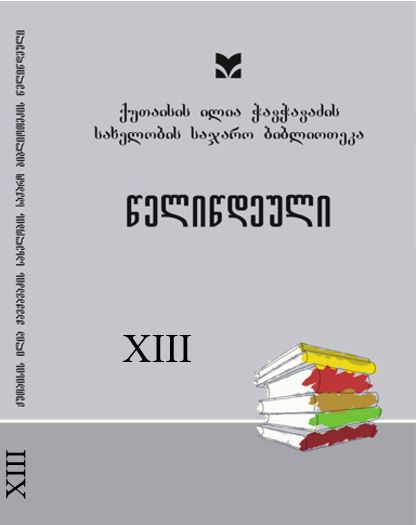Surnames and Names in the Historical Documents of Kartli-Kakheti Monasteries and Churches
DOI:
https://doi.org/10.48614/yk.13.2021.65-73Keywords:
Georgian Language, Kartli-Kakheti, Surnames, Historical DocumentsAbstract
This article studies the surnames in the historical documents of Kartli-Kakheti monasteries and churches. For analysis, we use the historical documents of KartliKakheti monasteries and churches collected by T. Zhordania, which was published in L. Tugushi printing house, Poti. The rich and varied material presented here allows us, on the one hand, to follow chronologically the development of events around the subject to be studied in the XVII-XVIII centuries and to gather the linguistic facts related to it. These historical documents are original and diverse in content.
They reflect the many areas of the social-political and economic life of Georgia and, according to their content, determine the issues of relations with the Church, the relationship between Batoni (lord) and Qma-Glekhi (slave-peasant), law, and other.
Here are confirmed the surnames and names that have undergone a phoneticmorphological change(Choloq’ashvili-Cholaq’ashvili). Surnames ending in „shvili“ retain the element of relative case - s in most cases. There are also forms where the element of relative case – s is lost. Both surnames (Tumanishvili, Otiashvili, Tsitsishvili, K’virikashvili, K’arich’ashvili) and paternity (Patarkatsisshvili – Patarkatsi’s child, K’virikasshvili –Kvirika’s child, Ch’anisshvili- Chanisshvili’s child, IotamasshviliIotama’s child…) are always written together in manuscripts. The manuscripts do not have any firmly preserved mark of difference between the surname and paternity relationship. The surnames confirmed in the manuscript are based on the male name, nicknames, and names of animals, birds, or crafts. Most the surnames are made by adding „-ia“, „-el“, „-ul“, „-ian“, „dze“ (a son) and „shvili“ (a child) to the base of the name. Here we find the surnames of both the feudal family and the slave peasants.
Ecclesiastical persons are represented only by names and titles („Mtavarep’isk’oposiioane“, „Alaverdeli Nikoloz“, „ArsenNinots’mindeli“ The surnames of certain populated villages are especially interesting. The surnames living in the village of Patardzeuli are especially diverse(Laperashvili, Estatashvili, Usufashvili, T’urikashvili, Zhat’eli, K’ats’aralia, Modzmanashvili, Kurdghelashvili, Mchedlishvili, Mtiulishvili, Japaridze, Iiordanishvili, Vedriashvili, Perinozashvili, Q’azarashvili...).




